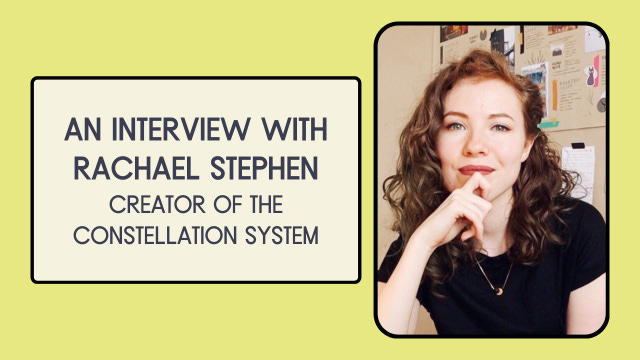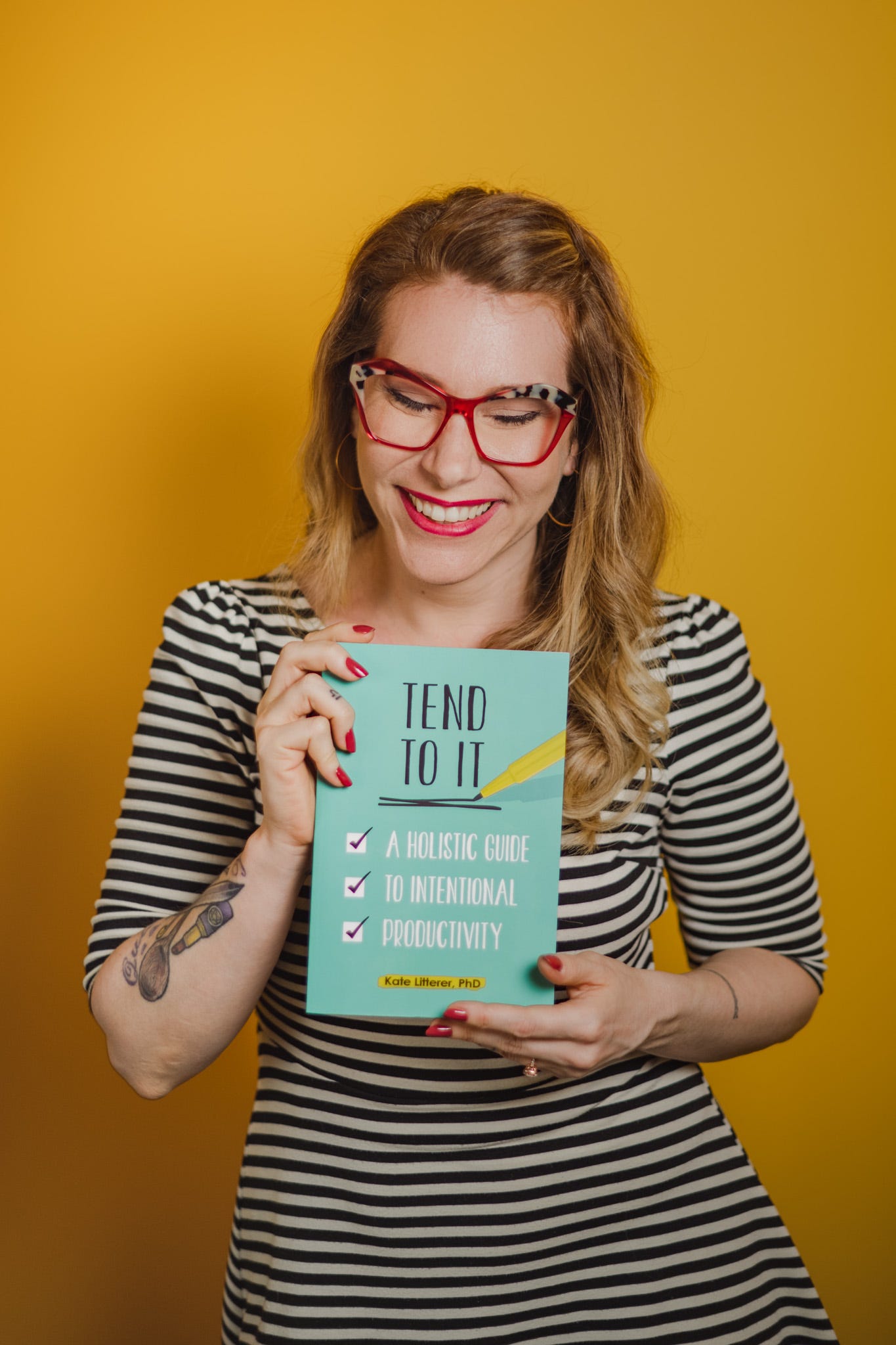You can listen to an audio version of this newsletter above. Please note that this is unedited and I’m recording in my home office. It’s been raining today, so you may hear some cars driving through puddles.
Before we get started, I want to share the ways we can work together.
I’m running a workshop for PhD Life Raft’s Month of Mondays next Monday, June 12th (it’s live and recorded). I’m currently accepting new 1-on-1 coaching clients (10% discount for paid tending subscribers), booking workshops with universities and organizations, offering my 6-week Intentionally Productive Scholars Program for undergraduates, and building a waitlist for Perceptible Progress: A Goals Course, which I plan to run in July. If you’re curious about any of these, reach out via email (Kate@KateHenry.com) or schedule yourself in for a free 30-minute chat with me. Thank you!

As a productivity scholar, I’ve studied hundreds of tools and approaches and developed a few of my own. It would be difficult to rank them all in terms of effectiveness or enjoyability, but if I had to choose five that are currently improving my quality of life, they would be:
Slow Productivity: Productivity through the lens of Slow Living, a topic I’ve discussed on podcasts like The Slow Home Podcast (now The Tortoise).
Spoon Theory: a way to measure, track, and communicate energy levels for folks who live with chronic health conditions
The Goldilocks Approach to Productivity: my tool for developing accessible productivity sessions
Sarah Knight’s “Must-Do Method”: A way to shift from a bottomless to-do list to scheduling tasks by the day they need to be started or finished, so you can increase your rest and downtime
Rachael Stephen’s Constellation System: A system for organizing your personal and professional projects and tasks so you can break free of the work/life dichotomy. Rachael calls it “Practical Magick for Organization,” which absolutely feels appropriate.
Today I want to highlight the Constellation System.
I discovered Rachael Stephen’s work in 2021 when I was a budding bullet journaler. My friend Siloh (a mixed-genre writing coach who writes essays and a stunning Substack) recommended Rachael’s work to me, and I’ve returned to the Constellation System again and again.
I interviewed Rachael about the Constellation System about a year ago. Since I switched to Substack, I’ve gained many new readers (hello! thanks for reading!) and want to touch on this top-tier tool again to make sure as many people as possible know about it.
Who’s Rachael Stephen?
Rachael Stephen is a writer, maker and secular witch. She is the author of the novel State of Flux, and founder of the Story Magic Academy – an online school for creative storytelling. Based in Glasgow, Scotland, she spends her time writing, teaching, and making YouTube videos.
Here’s the link to sign up for Rachael’s Patreon, which includes access to lots of extra goodies and a robust community on Discord.
Here’s the link to sign up for Rachael’s newsletter, which is how you’ll find out about her future offerings.
Here’s the link to Rachael’s Constellation Clarity Course, which I took earlier this year and found really helpful and fun. She’s currently accepting folks for the next offering’s waitlist.
What’s the Constellation System?
The gist of Rachael’s system is that there are six “life domains,” each pertaining to a particular realm of our lives. Each domain fits into three systems:
the Garden: What should I do?
the Almanac: When should I do it?
and the Ritual: How do I get myself to do it?
You can learn more about the Garden, Almanac, and Ritual in Rachael’s Quickstart Guide to the Constellation System.
Let’s focus on the six domains. This is the concept I find myself engaging with the most. Here’s Rachael’s summary of the domains along with the sigil she uses for each:
꩜ Genero: creativity, hobbies, labours of love, passion projects, meaning
﹩Divitiae: paid work, money, financial management, resources
⌂ Domum: home, environment, physical space, household and domestic work
⏀ Corporalis: body, physical health, nourishment, movement, style and expression
⚭ Socialis: relationships, connectedness, people, family, community, beyond the self
✦ Spiritus: mind, mental health, spirituality, learning, study
How I use the domains
I use Rachael’s sigil symbols for my domains and I assign each one a color, so I can easily identify the domain for each task when I look at my bullet journal or Google Calendar.
Instead of seeing a walloping running to-do list, I’m able to quickly check how many Divitiae (work) tasks are on a certain day. If I’m going days and days without any Socialis (other people I love) or Spiritus (spirituality/mental health) activities, it’s time to add in a phone call with a friend or take a break from work to rest.
The six domains are great for reflection and planning. When I plan each quarter, I think about my goals and projects for each of my domains: how did things go last quarter? What would I like to focus on in the next season? What are my priority projects? Which domain is on the front or back burner?
Want to learn more?
Check out my interview with Rachael about the reasons why she created the Constellation System and how it can help to improve people’s experiences with productivity, rest, and tending to themselves.
What about you?
Do you use the Constellation System? Do you use something similar? I’d love to hear!
Curiosities
This section of my letters is for things that made me say “hmmm” or “wow!” recently.
Kris and I are currently decluttering our apartment, and it’s always interesting to go back through my books from grad school, determining what to keep or donate. It’s unlikely I’ll open my books on feminist archival practices anytime soon, but they’re dear to my heart, so they stick around through every decluttering cycle. One of my favorite experiences in grad school was researching historiography, the study of the ways history is written. As an archival researcher who worked with documents from early to mid-20th Century, I am fascinated with the ways queer people use periodicals to connect with one another. This eventually led me to my dissertation topic: the ways Lisa Ben (the woman who wrote the first lesbian magazine in the U.S., Vice Versa) used writing and songs to subvert anti-homosexual rhetoric that was rampant in films, books, and news at the time. She was whip smart, creative, and very talented. You can learn more about her here and read copies of Vice Versa here.
Current video games my household is playing: Control on Playstation and Zelda: Tears of the Kingdom on Nintendo Switch. We’re actually replaying Control because it’s been a few years and it’s really good: you have telekinetic powers and the setting is a paranormal building with sentient objects. Zelda continues to be very fun and I am currently doing side quests like a champ.
I’m going to visit our town’s farmer’s market for the first time next week and I am very excited.
For Your Consideration
Follow me on Instagram
Order my book, Tend to It: A Holistic Guide to Intentional Productivity
Listen to my podcast interviews
xo,
Dr. Kate















Yay for the farmer's market! How was it? Ours also has a great coffee truck and is conveniently next to a playground/park.
This is a really cool break down of aspects of one's life. I think it would make a good journal/calendar if one were looking to create these kinds of things. I guess you could simply color-code!